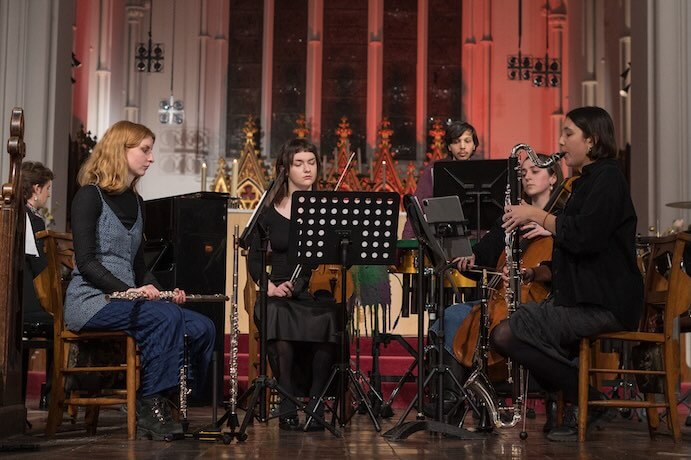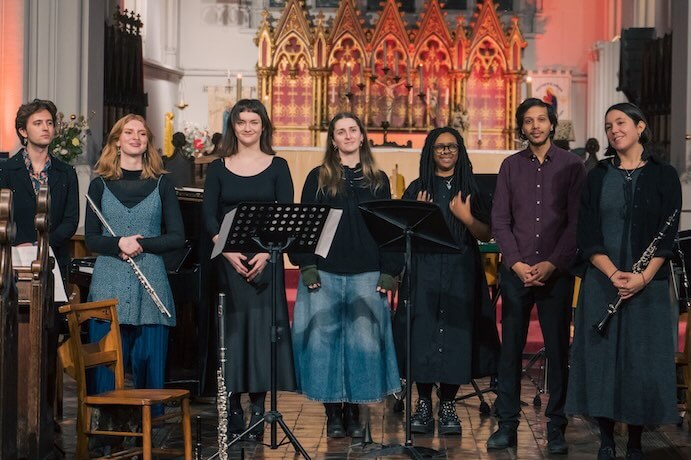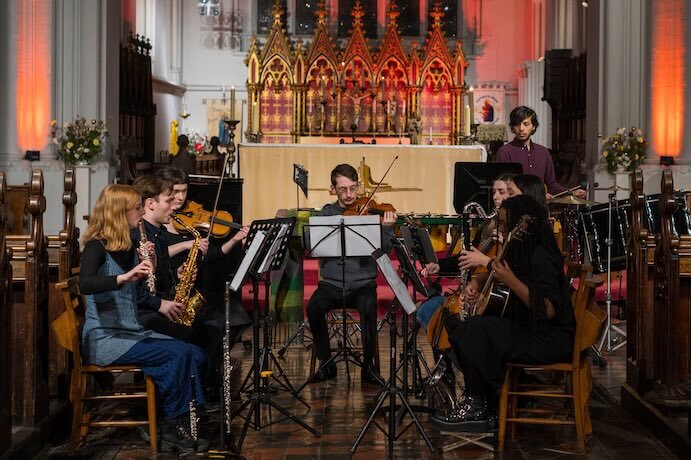Formed at the Royal College of Music in 2022, standard issue describe themselves as ‘a London-based new music collective dedicated to creating inclusive spaces to hear, see, and take part in new and experimental work.’ Directed by Croatian-American clarinettist Michelle Hromin, their most distinctive feature is their championing of contemporary American composers who are rarely, if ever, heard on this side of the pond. I came across the music of inti figgis-vizueta thanks to them, and their 2 February programme featured both US and UK creators. It is also welcome that they promote what might be termed ‘contemporary classics,’ even though, in reality, these works are very seldom heard live.
The concert opened with Maombi Asante (Prayer of Thanks) by Valerie Coleman, a joyful, celebratory, toe-tapping work for flute (Tilly Coulton), violin (Amalia Young) and cello (Rebecca Burden). Each player had her moment in the spotlight, and they all responded to the vitality of this immediately engaging piece. Chamber groups should get to know and programme Coleman’s work.
It is unfortunate for the ensemble that the only problematic aspects of the event were things they couldn’t control. The venue host at St Giles Camberwell warmly welcomed standard issue, remembering their debut performance in June 2022, but the noisy heating system was a distraction in quieter moments, and the tinny upright piano was of very poor quality.

Kieran Crowley, Tilly Coulton, Amalia Young, Toril Azzalini-Machecler, Rebecca Burden, and Michelle Hromin of standard issue — Photo by Lakruwan Rajapaksha
Toru Takemitsu was a pioneer in blending his Japanese heritage with Western modern classical language (with a distinctly French flavour), and his music has always appealed to me. His 1981 three-movement work Toward the Sea for alto flute (Coulton) and guitar (Shannon-Latoyah Simon) was sensitively performed, though I wonder whether audience members seated further away from the players were also able to appreciate the delicate sounds. Toward the Sea was commissioned by Greenpeace for their Save the Whales campaign, and the composer was also inspired by “Moby Dick,” linking the piece with the US strand of the programme. Both performers captured the work’s ebb and flow and subtle colour shifts, though background noise in the venue meant that Takemitsu’s dialogue between sound and silence could not be fully conveyed.
standard issue also commissions new work, and Serenade II by the young British composer Oscar Ridout was premiered during this concert. The composer stated that the serenade is essentially a ‘private, personal’ medium, and his challenge was to use an ensemble of eight instruments to capture an introverted mood. His combination of alto flute, guitar, bass clarinet, saxophone, violin, viola, cello, and percussion was very impressively balanced by standard issue, who work without a conductor. I was immediately drawn to the piece, which grew out of swelling cymbal rolls (Toril Azzalini-Machecler, outstanding throughout) and was largely chordal with occasional bursts of activity from guitar or rapid descending string gestures. Towards the end, the violist (Gordon Cervoni) moved his music stand aside, stood up and continued playing his instrument while walking to the other end of the church, adding spatial intrigue to this striking work. This is a piece, and a composer, I want to hear again.

Kieran Crowley, Tilly Coulton, Amalia Young, Rebecca Burden, Shannon-Latoyah Simon, Toril Azzalini-Machecler, Michelle Hromin — Photo by Lakruwan Rajapaksha
Ridout apparently proposed Nicola LeFanu’s Sextet (A Wild Garden), composed in 1996 for flutes, clarinets, percussion, piano, violin and cello, for this programme. The daughter of Elizabeth Maconchy, LeFanu was for many years Professor of Music at York University, Ridout’s alma mater. She has been an advocate for women in music for decades – long before it was a fashionable cause – though her own music is all too rarely performed. LeFanu’s Sextet divides the ensemble into constantly varied subgroups, and the composer often uses lively percussion interjections to initiate a new idea. Her colour shifts were fascinating – cello/bass clarinet, alto flute/bongos, clarinet/vibraphone/piccolo/piano in its treble register, and much more – and standard issue clearly relished the exciting interplay of sonorities.
Both LeFanu’s work and Viet Cuong’s Electric Aroma really needed a decent piano to complement the rest of the ensemble. Cuong’s piece, premiered at the Eighth Blackbird Creative Lab (shout out to whoever comes up with these wonderful US contemporary ensemble names) ended the concert in an energetic mood. Incisive fragments on flute, clarinet, and piano, circling around a narrow range of pitches, contrasted with percussive knocking, dinging and the friction of the bowed vibraphone. What is basically a conventional musical language is made more unusual by woodwind quarter-tone slides. standard issue clearly enjoyed the rhythmic vitality of this piece.
We are lucky in London to have so many excellent instrumentalists from around the world emerging from conservatoires, and a contemporary music scene that is constantly being renewed by new ensembles. In just two and a half years, standard issue have established themselves as a group who work really well together and who promote international repertoire that UK audiences ought to hear. And in 2025, this intercultural understanding is needed more than ever.
I CARE IF YOU LISTEN is an editorially-independent program of the American Composers Forum, and is made possible thanks to generous donor and institutional support. Opinions expressed are solely those of the author and may not represent the views of ICIYL or ACF.
You can support the work of ICIYL with a tax-deductible gift to ACF. For more on ACF, visit composersforum.org.






